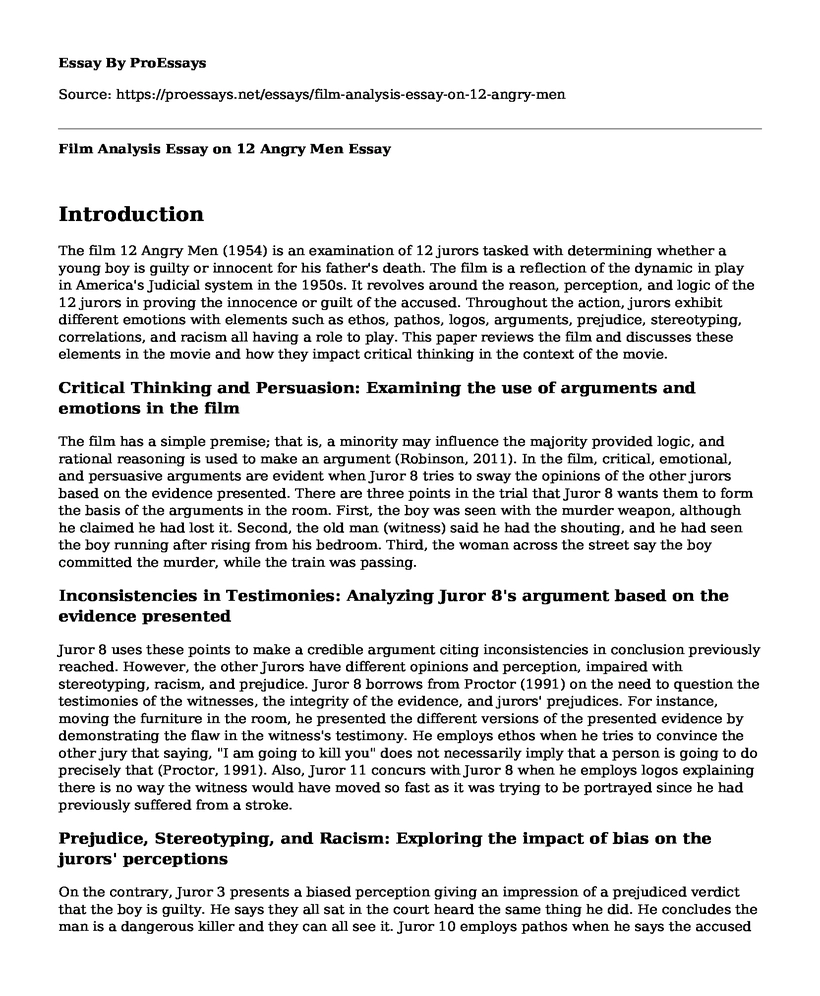Introduction
The film 12 Angry Men (1954) is an examination of 12 jurors tasked with determining whether a young boy is guilty or innocent for his father's death. The film is a reflection of the dynamic in play in America's Judicial system in the 1950s. It revolves around the reason, perception, and logic of the 12 jurors in proving the innocence or guilt of the accused. Throughout the action, jurors exhibit different emotions with elements such as ethos, pathos, logos, arguments, prejudice, stereotyping, correlations, and racism all having a role to play. This paper reviews the film and discusses these elements in the movie and how they impact critical thinking in the context of the movie.
Critical Thinking and Persuasion: Examining the use of arguments and emotions in the film
The film has a simple premise; that is, a minority may influence the majority provided logic, and rational reasoning is used to make an argument (Robinson, 2011). In the film, critical, emotional, and persuasive arguments are evident when Juror 8 tries to sway the opinions of the other jurors based on the evidence presented. There are three points in the trial that Juror 8 wants them to form the basis of the arguments in the room. First, the boy was seen with the murder weapon, although he claimed he had lost it. Second, the old man (witness) said he had the shouting, and he had seen the boy running after rising from his bedroom. Third, the woman across the street say the boy committed the murder, while the train was passing.
Inconsistencies in Testimonies: Analyzing Juror 8's argument based on the evidence presented
Juror 8 uses these points to make a credible argument citing inconsistencies in conclusion previously reached. However, the other Jurors have different opinions and perception, impaired with stereotyping, racism, and prejudice. Juror 8 borrows from Proctor (1991) on the need to question the testimonies of the witnesses, the integrity of the evidence, and jurors' prejudices. For instance, moving the furniture in the room, he presented the different versions of the presented evidence by demonstrating the flaw in the witness's testimony. He employs ethos when he tries to convince the other jury that saying, "I am going to kill you" does not necessarily imply that a person is going to do precisely that (Proctor, 1991). Also, Juror 11 concurs with Juror 8 when he employs logos explaining there is no way the witness would have moved so fast as it was trying to be portrayed since he had previously suffered from a stroke.
Prejudice, Stereotyping, and Racism: Exploring the impact of bias on the jurors' perceptions
On the contrary, Juror 3 presents a biased perception giving an impression of a prejudiced verdict that the boy is guilty. He says they all sat in the court heard the same thing he did. He concludes the man is a dangerous killer and they can all see it. Juror 10 employs pathos when he says the accused "is just a common ignorant slob; he does not even speak good English." This also portrays racism. Besides, he demonstrates stereotyping, describing slum dwellers as bad people. He says, "They get drunk...oh, they're real big drinkers, all of them - you know that - and bang: someone's lying in the gutter'... That is the way they are!... VIOLENT!" (Proctor, 1991, p. 5). To Juror 10, there is a correlation between violence and dwelling in slums.
Conclusion
The 12 Angry Men concerns moral and ethical issues. It describes the dilemma involved when a person's life is in the hands of ordinary people with personal baggage, assumptions, and values. It also shows that the proof of guilt or innocence is a difficult task as it requires reason and logic.
References
Fonda, H., Rose, R, and Lumet, S. (1954). 12 angry men [Motion picture]. United States: Orion-Nova Productions.
Proctor, R. (1991). Do the ends justify the means, Thinking critically about "Twelve Angry Men." Retrieved from: https://eric.ed.gov/?id=ED336784
Robinson, S. R. (2011). Teaching logic and teaching critical thinking: revisiting McPeck. Higher Education Research & Development, 30(3), 275-287. DOI: 10.1080/07294360.2010.500656
Cite this page
Film Analysis Essay on 12 Angry Men . (2022, Mar 25). Retrieved from https://proessays.net/essays/film-analysis-essay-on-12-angry-men
If you are the original author of this essay and no longer wish to have it published on the ProEssays website, please click below to request its removal:
- The Role of Social Media in Peoples Revolution
- Theatre Studies Thesis: Violence in the Plays by Sarah Kane
- Poetry Analysis Essay on The Love Song J. Alfred Prufrock
- Essay Sample on West Beirut: A Tale of Two Teens in War-Torn Lebanon
- The Art of Deception: Exploring Shakespeare's Macbeth - Essay Sample
- Paper Example on A Remarkable Discovery: April May's Encounter With The Alien Carl
- Paper Sample on White Superiority Over Black: 12 Years a Slave Showcases Brutal History







